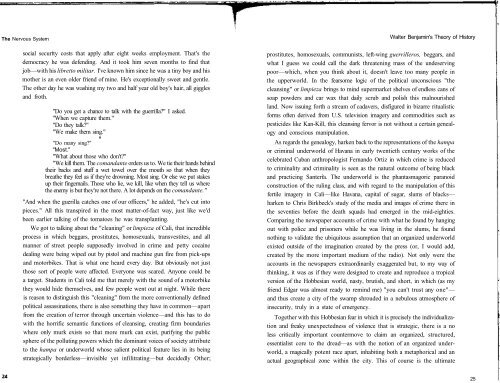The Nervous System - Department of English and Comparative ...
The Nervous System - Department of English and Comparative ...
The Nervous System - Department of English and Comparative ...
You also want an ePaper? Increase the reach of your titles
YUMPU automatically turns print PDFs into web optimized ePapers that Google loves.
<strong>The</strong> <strong>Nervous</strong> <strong>System</strong><br />
social security costs that apply after eight weeks employment. That's the<br />
democracy he was defending. And it took him seven months to find that<br />
job—with his libretto militar. I've known him since he was a tiny boy <strong>and</strong> his<br />
mother is an even older friend <strong>of</strong> mine. He's exceptionally sweet <strong>and</strong> gentle.<br />
<strong>The</strong> other day he was washing my two <strong>and</strong> half year old boy's hair, all giggles<br />
<strong>and</strong> froth.<br />
"Do you get a chance to talk with the guerrilla?" I asked.<br />
"When we capture them."<br />
"Do they talk?"<br />
"We make them sing."<br />
o<br />
"Do many sing?"<br />
"Most."<br />
"What about those who don't?"<br />
"We kill them. <strong>The</strong> com<strong>and</strong>ante orders us to. We tie their h<strong>and</strong>s behind<br />
their backs <strong>and</strong> stuff a wet towel over the mouth so that when they<br />
breathe they feel as if they're drowning. Most sing. Or else we put stakes<br />
up their fingernails. Those who lie, we kill, like when they tell us where<br />
the enemy is but they're not there. A lot depends on the com<strong>and</strong>ante."<br />
"And when the guerilla catches one <strong>of</strong> our <strong>of</strong>ficers," he added, "he's cut into<br />
pieces." All this transpired in the most matter-<strong>of</strong>-fact way, just like we'd<br />
been earlier talking <strong>of</strong> the tomatoes he was transplanting.<br />
We got to talking about the "cleaning" or limpieza <strong>of</strong> Cali, that incredible<br />
process in which beggars, prostitutes, homosexuals, transvestites, <strong>and</strong> all<br />
manner <strong>of</strong> street people supposedly involved in crime <strong>and</strong> petty cocaine<br />
dealing were being wiped out by pistol <strong>and</strong> machine gun fire from pick-ups<br />
<strong>and</strong> motorbikes. That is what one heard every day. But obviously not just<br />
those sort <strong>of</strong> people were affected. Everyone was scared. Anyone could be<br />
a target. Students in Cali told me that merely with the sound <strong>of</strong> a motorbike<br />
they would hide themselves, <strong>and</strong> few people went out at night. While there<br />
is reason to distinguish this "cleaning" from the more conventionally defined<br />
political assassinations, there is also something they have in common—apart<br />
from the creation <strong>of</strong> terror through uncertain violence—<strong>and</strong> this has to do<br />
with the horrific semantic functions <strong>of</strong> cleansing, creating firm boundaries<br />
where only murk exists so that more murk can exist, purifying the public<br />
sphere <strong>of</strong> the polluting powers which the dominant voices <strong>of</strong> society attribute<br />
to the hampa or underworld whose salient political feature lies in its being<br />
strategically borderless—invisible yet infilitrating—but decidedly Other;<br />
Walter Benjamin's <strong>The</strong>ory <strong>of</strong> History<br />
prostitutes, homosexuals, communists, left-wing guerrilleros, beggars, <strong>and</strong><br />
what I guess we could call the dark threatening mass <strong>of</strong> the undeserving<br />
poor—which, when you think about it, doesn't leave too many people in<br />
the upperworld. In the fearsome logic <strong>of</strong> the political unconscious "the<br />
cleansing" or limpieza brings to mind supermarket shelves <strong>of</strong> endless cans <strong>of</strong><br />
soap powders <strong>and</strong> car wax that daily scrub <strong>and</strong> polish this malnourished<br />
l<strong>and</strong>. Now issuing forth a stream <strong>of</strong> cadavers, disfigured in bizarre ritualistic<br />
forms <strong>of</strong>ten derived from U.S. television imagery <strong>and</strong> commodities such as<br />
pesticides like Kan-Kill, this cleansing fervor is not without a certain genealogy<br />
<strong>and</strong> conscious manipulation.<br />
As regards the genealogy, harken back to the representations <strong>of</strong> the hampa<br />
or criminal underworld <strong>of</strong> Havana in early twentieth century works <strong>of</strong> the<br />
celebrated Cuban anthropologist Fern<strong>and</strong>o Ortiz in which crime is reduced<br />
to criminality <strong>and</strong> criminality is seen as the natural outcome <strong>of</strong> being black<br />
<strong>and</strong> practicing Santeria. <strong>The</strong> underworld is the phantasmagoric paranoid<br />
construction <strong>of</strong> the ruling class, <strong>and</strong> with regard to the manipulation <strong>of</strong> this<br />
fertile imagery in Cali—like Havana, capital <strong>of</strong> sugar, slums <strong>of</strong> blacks—<br />
harken to Chris Birkbeck's study <strong>of</strong> the media <strong>and</strong> images <strong>of</strong> crime there in<br />
the seventies before the death squads had emerged in the mid-eighties.<br />
Comparing the newspaper accounts <strong>of</strong> crime with what he found by hanging<br />
out with police <strong>and</strong> prisoners while he was living in the slums, he found<br />
nothing to validate the ubiquitous assumption that an organized underworld<br />
existed outside <strong>of</strong> the imagination created by the press (or, I would add,<br />
created by the more important medium <strong>of</strong> the radio). Not only were the<br />
accounts in the newspapers extraordinarily exaggerated but, to my way <strong>of</strong><br />
thinking, it was as if they were designed to create <strong>and</strong> reproduce a tropical<br />
version <strong>of</strong> the Hobbesian world, nasty, brutish, <strong>and</strong> short, in which (as my<br />
friend Edgar was almost ready to remind me) "you can't trust any one"—<br />
<strong>and</strong> thus create a city <strong>of</strong> the swamp shrouded in a nebulous atmosphere <strong>of</strong><br />
insecurity, truly in a state <strong>of</strong> emergency.<br />
Together with this Hobbesian fear in which it is precisely the individualization<br />
<strong>and</strong> freaky unexpectedness <strong>of</strong> violence that is strategic, there is a no<br />
less critically important countermove to claim an organized, structured,<br />
essentialist core to the dread—as with the notion <strong>of</strong> an organized underworld,<br />
a magically potent race apart, inhabiting both a metaphorical <strong>and</strong> an<br />
actual geographical zone within the city. This <strong>of</strong> course is the ultimate<br />
25
















